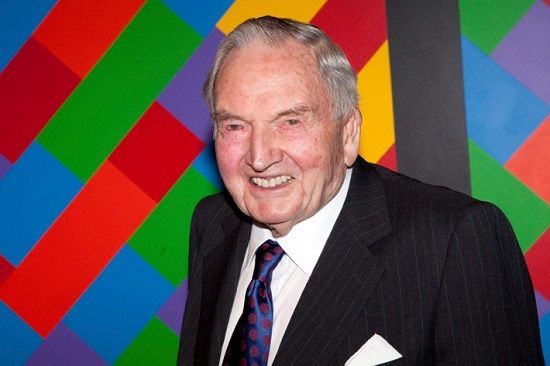David Rockefeller, the U.S. banker, philanthropist, presidential adviser and heir to one of history’s greatest fortunes, has died.
At 101, he was the world’s oldest billionaire. He died Monday at his home in Pocantico Hills, New York, according to an emailed statement from Fraser P. Seitel, a family spokesman. The cause was congestive heart failure.
Rockefeller was the youngest and last-surviving grandson of Standard Oil founder John D. Rockefeller, the nation’s first billionaire. He was the only one of John D. Rockefeller Jr.’s five sons who spent his entire professional career in the corporate world, rising to chief executive officer of Chase Manhattan Bank during his 35 years at the company.
He was also a close friend of world leaders, from Deng Xiaoping in China to Nelson Mandela in South Africa, from the shah of Iran to Henry Kissinger. Rockefeller famously asked President Jimmy Carter to let the deposed shah come to the U.S. for medical treatment, leading to the seizure of American hostages in Tehran from 1979 to 1981.
Rockefeller was equally well known for his philanthropy. In 2006, he bequeathed $225 million to the Rockefeller Brothers Fund, which he and his brothers established in 1940 to promote social change worldwide.
The year before, he donated $100 million each to two New York institutions: the Museum of Modern Art, which was co-founded by his mother, and Rockefeller University, a medical-research school started by his grandfather.
“No individual has contributed more to the commercial and civic life of New York City over a longer period of time than David Rockefeller,” former New York Mayor Michael Bloomberg said in a statement. “During my time in City Hall, he was always there for the city when we called,” said Bloomberg, the founder and majority owner of Bloomberg News parent Bloomberg LP.
David Rockefeller’s death closes a chapter in the family’s storied history. Known simply as “The Brothers,” David, Laurance, John, Nelson and Winthrop traversed the intersecting worlds of business, politics, philanthropy and the arts as no other U.S. family had ever done.
Rockefeller once joked that he was the only Rockefeller of his generation who had to “work for a living.” He was either chairman, president or CEO of Chase from 1957 to 1981, creating a global financial institution, traveling to 103 countries and meeting with dozens of presidents, kings and prime ministers. He accumulated about 150,000 names in an electronic Rolodex.
Rockefeller was criticized for meeting with dictators including Cuba’s Fidel Castro and Iraq’s Saddam Hussein. A member of the Council on Foreign Relations for more than 60 years and its chairman for 15, Rockefeller was also a frequent target of conspiracy theorists because of his membership in secretive international policy groups such as the Trilateral Commission and the Bilderberg Group.
Rockefeller, who watched the twin towers burn from his 56th-floor Rockefeller Center office on Sept. 11, 2001, was an honorary member of the panel to design a memorial to the victims of the terrorist attacks.
His influential and busy life will be remembered for a lot of decades to come.
